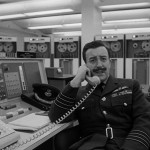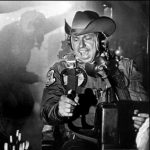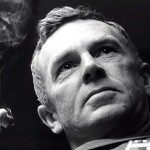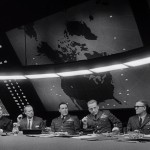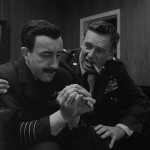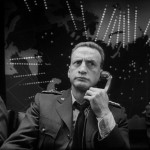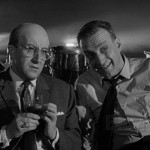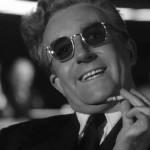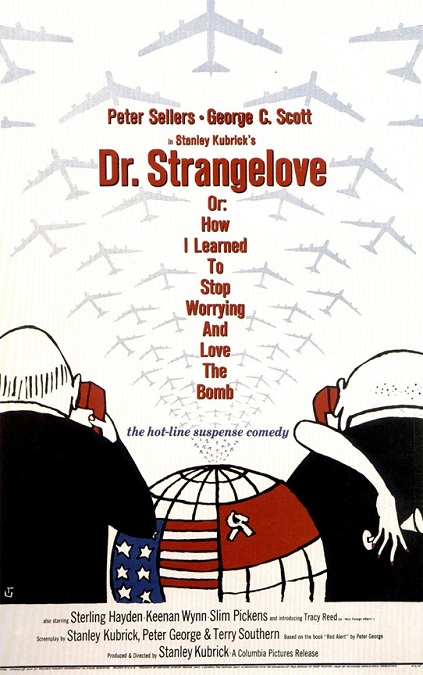
Dr. Strangelove or: How I Learned to Stop Worrying and Love the Bomb – 1964
First and foremost, this film was a political satire black comedy, directed by Stanley Kubrick. But beneath that veneer, it bordered on simple farce. It targets the subject of the Cold War, which was a current and relevant issue in the 1960s. However, I feel that, though there were plenty of valid things about the government and the military that were being made fun of, many of the jokes have lost their significance in the modern era. In 1964 it all would have been quite topical, but today, much of that quality has been lost.
The film starred Peter Sellers in 3 different and very distinct roles. He played a British RAF exchange officer, Captain Mandrake. He also played the President of the United States, Merkin Muffley. And finally, he played the film’s title role, Dr. Strangelove, a wheelchair-bound nuclear war expert and former Nazi. Then, there were three other significant characters in the film. Sterling Hayden played Brigadier General Jack Ripper. George C. Scott played General Buck Turgidson. And last, but not least, Slim Pickens played Major T. J. Kong.
In order to get to the point of the movie’s full title, I’ll give as brief a synopsis of the movie as I can. The U.S. has a great many bombers positioned around the Russian border, waiting for bombing codes from their superiors. General Ripper is the only man who has the codes to order the bombers to attack their targets with a devastating barrage of H-bombs. He is also the only man with the proper codes to recall them. Ripper goes crazy and orders an unprovoked, all-out attack on the “Ruskies”. Kong is one of the pilots who receives the code for the attack.
In the war-room at the Pentagon, President Muffley calls in his entire staff of Military advisors, including Turgidson and Strangelove, to deal with the situation. Turgidson is excited by the prospect of war, as are all evil military men, though Mufley does everything he can to avert mutually assured destruction. The Russian Ambassador, Alexei de Sadeski, Played by Peter Bull, informs him that if the U.S. drops any bombs on Russia, an automatic and unstoppable device will set off a doomsday machine which will irradiate the surface of the earth, destroying all life for the next hundred years.
After Ripper commits suicide, Captain Mandrake figures out the recall code and recalls all the bombers. But it is all for nothing. Kong’s communication equipment has been damaged, and he does not receive the recall code. He proceeds to bomb his target, ensuring a world-wide nuclear holocaust.
Knowing that the world is now doomed, Dr. Strangelove deduces that humanity’s only hope is to get as many people as possible to take up residence in deep mine-shafts, away from the radiation, for the next hundred years. In order to ensure sufficient breeding stock to repopulate the earth, there would have to be ten women for every man, each of whom would spend the remainder of his days making love to as many women as possible. Thus: How I learned to stop worrying and love the bomb.
Yes, it is a silly farce, and to be sure, there were some very funny moments. Seller’s portrayal of the ex-Nazi, Strangelove, was particularly hilarious, especially when his crippled right arm would randomly spring up into a Nazi “sieg heil!” salute. He would also slip and call the U.S. President “Mein Führer.” But for my tastes, many of the jokes just weren’t all that funny. The humor was there, but it was so dry that I found myself not laughing.
One of the biggest things being satirized was the extreme paranoia of military leaders who were dealing with the Cold War and the threat of nuclear annihilation. Another was the stupidity and ineffectualness of the leaders of the Russian and U.S. governments. But this was 1964, and many people believed in the reality of those things. And the very 60s concept of free love did not escape my notice.
But just because I didn’t find the political humor very funny, doesn’t mean the rest of the world didn’t. In 2000, readers of Total Film magazine voted it the 24th greatest comedic film of all time. It is also listed as number 26 on Empire’s 500 Greatest Movies of All Time. It has been described as “arguably the best political satire of the century.” Sure, it was a smarter film than Airplane!, but I’ll never stop laughing with that one.
